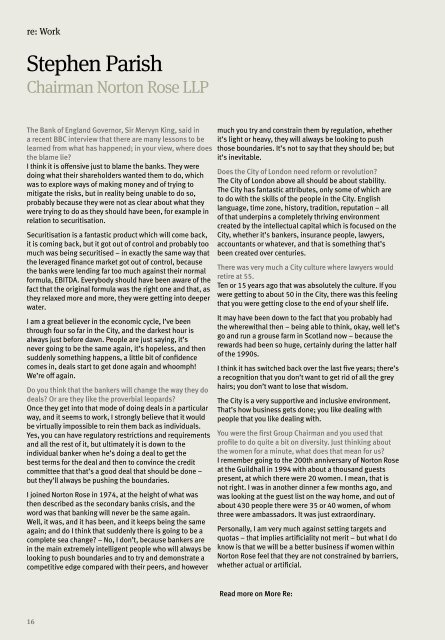A Norton Rose Group magazine Issue 3 Re: WoRk dementia the ...
A Norton Rose Group magazine Issue 3 Re: WoRk dementia the ...
A Norton Rose Group magazine Issue 3 Re: WoRk dementia the ...
Create successful ePaper yourself
Turn your PDF publications into a flip-book with our unique Google optimized e-Paper software.
e: Work<br />
Stephen Parish<br />
Chairman <strong>Norton</strong> <strong>Rose</strong> LLP<br />
<strong>the</strong> Bank of england Governor, sir mervyn king, said in<br />
a recent BBc interview that <strong>the</strong>re are many lessons to be<br />
learned from what has happened; in your view, where does<br />
<strong>the</strong> blame lie?<br />
I think it is offensive just to blame <strong>the</strong> banks. They were<br />
doing what <strong>the</strong>ir shareholders wanted <strong>the</strong>m to do, which<br />
was to explore ways of making money and of trying to<br />
mitigate <strong>the</strong> risks, but in reality being unable to do so,<br />
probably because <strong>the</strong>y were not as clear about what <strong>the</strong>y<br />
were trying to do as <strong>the</strong>y should have been, for example in<br />
relation to securitisation.<br />
securitisation is a fantastic product which will come back,<br />
it is coming back, but it got out of control and probably too<br />
much was being securitised – in exactly <strong>the</strong> same way that<br />
<strong>the</strong> leveraged finance market got out of control, because<br />
<strong>the</strong> banks were lending far too much against <strong>the</strong>ir normal<br />
formula, EBITDA. Everybody should have been aware of <strong>the</strong><br />
fact that <strong>the</strong> original formula was <strong>the</strong> right one and that, as<br />
<strong>the</strong>y relaxed more and more, <strong>the</strong>y were getting into deeper<br />
water.<br />
I am a great believer in <strong>the</strong> economic cycle, I’ve been<br />
through four so far in <strong>the</strong> City, and <strong>the</strong> darkest hour is<br />
always just before dawn. People are just saying, it’s<br />
never going to be <strong>the</strong> same again, it’s hopeless, and <strong>the</strong>n<br />
suddenly something happens, a little bit of confidence<br />
comes in, deals start to get done again and whoomph!<br />
We’re off again.<br />
Do you think that <strong>the</strong> bankers will change <strong>the</strong> way <strong>the</strong>y do<br />
deals? or are <strong>the</strong>y like <strong>the</strong> proverbial leopards?<br />
once <strong>the</strong>y get into that mode of doing deals in a particular<br />
way, and it seems to work, I strongly believe that it would<br />
be virtually impossible to rein <strong>the</strong>m back as individuals.<br />
Yes, you can have regulatory restrictions and requirements<br />
and all <strong>the</strong> rest of it, but ultimately it is down to <strong>the</strong><br />
individual banker when he’s doing a deal to get <strong>the</strong><br />
best terms for <strong>the</strong> deal and <strong>the</strong>n to convince <strong>the</strong> credit<br />
committee that that’s a good deal that should be done –<br />
but <strong>the</strong>y’ll always be pushing <strong>the</strong> boundaries.<br />
i joined norton <strong>Rose</strong> in 1974, at <strong>the</strong> height of what was<br />
<strong>the</strong>n described as <strong>the</strong> secondary banks crisis, and <strong>the</strong><br />
word was that banking will never be <strong>the</strong> same again.<br />
well, it was, and it has been, and it keeps being <strong>the</strong> same<br />
again; and do I think that suddenly <strong>the</strong>re is going to be a<br />
complete sea change? – no, i don’t, because bankers are<br />
in <strong>the</strong> main extremely intelligent people who will always be<br />
looking to push boundaries and to try and demonstrate a<br />
competitive edge compared with <strong>the</strong>ir peers, and however<br />
16<br />
much you try and constrain <strong>the</strong>m by regulation, whe<strong>the</strong>r<br />
it’s light or heavy, <strong>the</strong>y will always be looking to push<br />
those boundaries. It’s not to say that <strong>the</strong>y should be; but<br />
it’s inevitable.<br />
Does <strong>the</strong> city of London need reform or revolution?<br />
The City of London above all should be about stability.<br />
<strong>the</strong> City has fantastic attributes, only some of which are<br />
to do with <strong>the</strong> skills of <strong>the</strong> people in <strong>the</strong> City. english<br />
language, time zone, history, tradition, reputation – all<br />
of that underpins a completely thriving environment<br />
created by <strong>the</strong> intellectual capital which is focused on <strong>the</strong><br />
City, whe<strong>the</strong>r it’s bankers, insurance people, lawyers,<br />
accountants or whatever, and that is something that’s<br />
been created over centuries.<br />
<strong>the</strong>re was very much a city culture where lawyers would<br />
retire at 55.<br />
ten or 15 years ago that was absolutely <strong>the</strong> culture. if you<br />
were getting to about 50 in <strong>the</strong> City, <strong>the</strong>re was this feeling<br />
that you were getting close to <strong>the</strong> end of your shelf life.<br />
It may have been down to <strong>the</strong> fact that you probably had<br />
<strong>the</strong> wherewithal <strong>the</strong>n – being able to think, okay, well let’s<br />
go and run a grouse farm in scotland now – because <strong>the</strong><br />
rewards had been so huge, certainly during <strong>the</strong> latter half<br />
of <strong>the</strong> 1990s.<br />
I think it has switched back over <strong>the</strong> last five years; <strong>the</strong>re’s<br />
a recognition that you don’t want to get rid of all <strong>the</strong> grey<br />
hairs; you don’t want to lose that wisdom.<br />
The City is a very supportive and inclusive environment.<br />
That’s how business gets done; you like dealing with<br />
people that you like dealing with.<br />
You were <strong>the</strong> first <strong>Group</strong> Chairman and you used that<br />
profile to do quite a bit on diversity. Just thinking about<br />
<strong>the</strong> women for a minute, what does that mean for us?<br />
I remember going to <strong>the</strong> 200th anniversary of <strong>Norton</strong> <strong>Rose</strong><br />
at <strong>the</strong> guildhall in 1994 with about a thousand guests<br />
present, at which <strong>the</strong>re were 20 women. i mean, that is<br />
not right. i was in ano<strong>the</strong>r dinner a few months ago, and<br />
was looking at <strong>the</strong> guest list on <strong>the</strong> way home, and out of<br />
about 430 people <strong>the</strong>re were 35 or 40 women, of whom<br />
three were ambassadors. it was just extraordinary.<br />
Personally, I am very much against setting targets and<br />
quotas – that implies artificiality not merit – but what I do<br />
know is that we will be a better business if women within<br />
norton <strong>Rose</strong> feel that <strong>the</strong>y are not constrained by barriers,<br />
whe<strong>the</strong>r actual or artificial.<br />
read more on more re:




